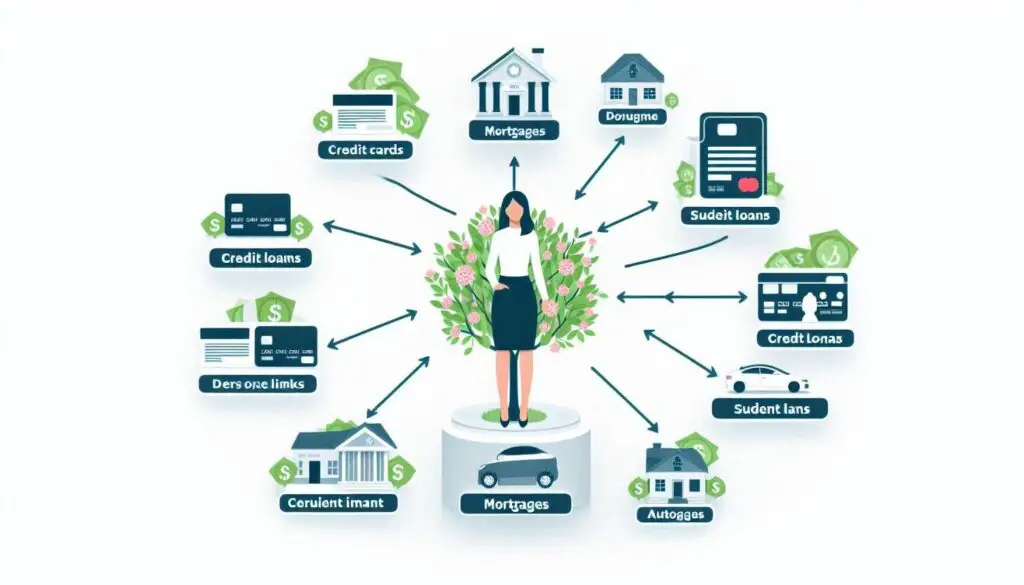Credit is a cornerstone of modern financial life, and understanding the Which Type of Credit is Usually Used for Cars, Mortgages, and Student Loans can make a world of difference in managing your finances.
Whether you’re looking to buy a car, purchase a home, or finance your education, knowing which type of credit is best suited for each can help you make smarter decisions.
Let’s dive into the world of credit and explore the different types used for cars, mortgages, and student loans.
Which Type of Credit is Usually Used for Cars, Mortgages, and Student Loans?

Understanding Credit Types
Before we get into the specifics of car loans, mortgages, and student loans, it’s important to understand what credit is and the different types available.
What is Credit?
At its core, credit is the ability to borrow money with the agreement to repay it later.
It’s a financial tool that enables you to manage large purchases and expenses over time.
When you take out credit, you’re essentially borrowing money that you’ll pay back in the future, typically with interest.
Understanding the different types of credit can help you choose the right one for your needs and manage your financial commitments effectively.
Types of Credit
There are several types of credit, each designed for different purposes. The main categories include:
- Revolving Credit
- Installment Credit
- Open Credit
Let’s break these down further to understand how they work.
Revolving Credit
Revolving credit is a type of credit that allows you to borrow up to a certain limit and repay it over time.
Credit cards are a common example of revolving credit. With revolving credit, you have a credit limit, and as you make payments, you can borrow again up to that limit.
This type of credit is flexible but can be risky if not managed properly, as it often comes with higher interest rates compared to other forms of credit.
Installment Credit
Installment credit is used for larger purchases and is repaid in fixed monthly payments over a set period.
This type of credit is commonly used for significant investments like cars, homes, and education.
The predictability of installment credit makes it easier to budget and plan your finances.
Unlike revolving credit, which can fluctuate, installment credit requires a consistent payment amount each month, making it more manageable for many borrowers.
Open Credit
Open credit is less common but worth mentioning. It involves a credit account with a fixed limit that needs to be paid in full each month.
This type of credit is often used with certain utility accounts, like electric or gas services, where you use the service and then pay the balance in full at the end of the month.
It’s not as flexible as revolving credit but can help manage regular monthly expenses.
Credit for Cars
When it comes to purchasing a car, the type of credit you use is crucial for managing your finances effectively.
Also Read – What are the Prospects of CFP Chartered Financial Planning?
Types of Auto Loans
Auto loans are a specific form of installment credit designed for purchasing vehicles.
These loans generally come with terms that range from 36 to 72 months.
An auto loan helps you spread out the cost of the car over a period, making it more affordable than paying the full amount upfront.
Secured vs. Unsecured Loans
Auto loans can be secured or unsecured.
- Secured Loans: These loans are backed by collateral, which, in this case, is the car itself. If you default on the loan, the lender has the right to repossess the vehicle to recover their losses.
- Secured loans often come with lower interest rates because the risk to the lender is reduced by the collateral.
- Unsecured Loans: Unsecured auto loans do not require collateral. They rely on your creditworthiness to determine the interest rate and terms. While this type of loan doesn’t risk losing your car, it often comes with higher interest rates compared to secured loans.
Loan Terms and Rates
The terms and rates of auto loans can vary based on several factors, including your credit score, the length of the loan, and the lender.
Generally, shorter-term loans come with higher monthly payments but lower overall interest costs.
On the other hand, longer-term loans offer lower monthly payments but result in higher interest costs over the life of the loan.
It’s important to weigh these factors when deciding on an auto loan to ensure it fits within your budget.
Credit for Mortgages
Buying a home is one of the most significant financial decisions you’ll ever make, and the type of credit used plays a critical role.

Types of Mortgage Loans
Mortgage loans are a type of installment credit specifically for purchasing real estate. They come in various forms, including:
- Conventional Loans: These are not insured or guaranteed by the federal government and often have stricter credit requirements.
- FHA Loans: Backed by the Federal Housing Administration, these loans are designed for lower-income and first-time homebuyers, often with lower down payment requirements.
- VA Loans: Provided by the Department of Veterans Affairs, VA loans are available to veterans, active service members, and certain members of the National Guard and Reserves. They often come with favorable terms and no down payment requirement.
Fixed-Rate vs. Adjustable-Rate
Mortgages are commonly classified as either fixed-rate or adjustable-rate.
- Fixed-Rate Mortgages: These mortgages have a constant interest rate and monthly payment throughout the life of the loan. This stability makes budgeting easier and protects you from interest rate fluctuations.
- Adjustable-Rate Mortgages (ARMs): ARMs have interest rates that can change over time based on market conditions. Typically, these loans start with a lower interest rate that adjusts periodically. While this can be advantageous if interest rates decrease, it also poses a risk if rates rise.
Mortgage Terms and Rates
Mortgage terms generally range from 15 to 30 years. A longer term means lower monthly payments but more interest paid over time.
Conversely, a shorter term has higher monthly payments but results in less interest paid overall.
Your interest rate will depend on factors such as your credit score, down payment, and market conditions.
Also Read – Jones Financial Planning for Charities
Credit for Student Loans
Financing your education is another area where understanding credit types can help you make informed choices.
Federal vs. Private Loans
Student loans can be categorized into federal and private loans:
- Federal Student Loans: These are issued by the government and often have lower interest rates and more favorable repayment terms. They also offer protections such as deferment and income-driven repayment plans, which can be beneficial if you face financial hardship.
- Private Student Loans: These loans are offered by banks or financial institutions and can vary widely in terms and conditions. Private loans may have higher interest rates and less flexible repayment options compared to federal loans. They can be a good option if you’ve exhausted federal loan options or need additional funding.
Loan Terms and Conditions
Federal student loans generally come with fixed interest rates and flexible repayment terms. Private student loans, on the other hand, might offer variable rates and have different terms and conditions depending on the lender.
It’s crucial to compare these options carefully to find the best fit for your financial situation.
Interest Rates and Repayment
Interest rates for federal loans are typically lower and fixed, providing stability in your repayment plan.
Private loan rates can be variable, which means they might change over time based on market conditions.
Federal loans often offer more flexible repayment options, including deferment and forbearance, which can be helpful if you encounter financial difficulties during or after school.
Comparing the Types of Credit
Now that we’ve explored car loans, mortgages, and student loans, let’s compare the different types of credit used for these purposes.

Key Differences
The main difference between the types of credit used for these big purchases is their structure:
- Revolving Credit: Often used for everyday expenses and smaller purchases. It offers flexibility but can lead to higher interest rates if not managed carefully.
- Installment Credit: Used for larger, long-term purchases like cars, homes, and education. It provides predictable payments and is often easier to budget for.
Choosing the Right Type for You
Choosing the right type of credit depends on your financial goals and situation.
For purchasing cars and homes, installment credit is usually the best option due to its structured payment plan.
When it comes to financing education, federal loans are often preferred for their favorable terms and protections, but private loans can be a viable alternative if needed.
Conclusion
Understanding the different types of credit available for cars, mortgages, and student loans is essential for making informed financial decisions.
Whether you’re buying a vehicle, purchasing a home, or investing in your education, knowing how each type of credit works can help you manage your finances more effectively.
By carefully considering your options and understanding the terms and conditions associated with each type of credit, you can make choices that align with your financial goals and situation.
FAQs
1. What type of credit is best for buying a car?
For buying a car, installment credit is typically the best option. Auto loans, which fall under installment credit, provide structured payments over a set period, making it easier to manage your budget.
2. How do fixed-rate and adjustable-rate mortgages differ?
Fixed-rate mortgages have a constant interest rate and monthly payment, offering stability and predictability. Adjustable-rate mortgages have variable interest rates that can change over time, potentially offering lower initial rates but with the risk of increased payments if rates rise.
3. Are federal student loans better than private loans?
Federal student loans often offer lower interest rates, more flexible repayment options, and additional protections compared to private loans. They are generally a better choice if you qualify, but private loans can be a useful option if you need additional funding.
4. Can I refinance an auto loan?
Yes, you can refinance an auto loan. This involves taking out a new loan to pay off your existing one, which can potentially lower your interest rate or adjust your loan terms based on your current financial situation.
5. What should I consider before taking out a mortgage?
Before taking out a mortgage, consider your credit score, down


2 thoughts on “Which Type of Credit is Usually Used for Cars, Mortgages, and Student Loans?”